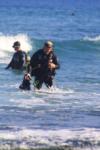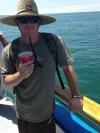
|
Are these dives from a boat or are they shore dives?
|
|

|
My first guess would be that you are not exhaling fully and loading up on CO2. AKA skip breathing. It will cause exactly what you are describing.
|
|

|
They were all boat dives...
I don’t think its seasickness as I never get motion sick...
|
|

|
I have had that comment before but since then, have always been very careful of my breathing since then.
It might be I guess, but then i dont know of any other way to breathe! lol! I have spent time with my instructor who has given me tips and help.
|
|

|
While diving, and particularly in areas of swell, wave action and surge, our senses and equilibrium are assaulted continuously by sensations that should cause disorientation, unbalance, and vertigo while in the water. Add this to the motion of the boat and sea sickness is not an unusual result (even for those who are not normally susceptible to motion sickness).
I have experienced the same thing from time to time. I have taken to using Dramamine – Less Drowsy formula which really helps.
Another consideration is that you might be experiencing gastric upset due to the buildup of digestive gases during the dive and then expansion of those gases as you ascent. In order to counter this effect, I usually am very careful about what & when I eat prior to diving. I also eat a couple of Saltine or (soda cracker) just prior to diving. This appears to help stem the gas buildup.
For additional information you may want to consult your doctor or visit Divers Alert Network at http://diversalertnetwork.org/
|
|

|
My wife has a similar experience if she spends too much time in water on the surface. It tends to make her sea sick. She doesn’t get motion sickness while on boats or once submerged and it does not include headaches.
The headaches do sound more like a CO2 problem associated with skip breathing. It could be brought on by how you attempt to control your buoyancy instead of skip breathing using shallow exhales. You may want to concentrate on doing just the reverse. Use more complete exhales and shorten the inhale. This way you can maintain the same buoyancy but rid yourself of the CO2. Watch your breathing cadence. You shouldn’t allow yourself any breathing discomfort trying to keep the inhale short. Use counting your breath cycle until your have reprogramed yourself to the new pattern naturally. Slowly count to 5 for a complete exhale, pause but do not stop before a slow 3 count on the inhale. First rule of scuba does still apply never stop breathing but use control to make sure you rid yourself of CO2 while maintaining buoyancy control and you may be surprised to find this will help your sac rate.
|
|

|
all the tanks filled at the same shop? maybe slightly contaminated air?
|
|

|
There are several possible causes for this several of them have been mentioned by others, first I would ask when the last time your regulators where benched, cleaned and serviced by a QUALIFIED tech. You may have some Mold build up.
The next question would be the Tanks are you diving rentals? or your own.
If they are your own I would have them cleaned professionaly and re inspected, if your diving Nitrox or tri mix you are at a higher risk of internal contamination if the tank(s) are not properly cared for.
If all those suggestions are in good order I would suggest that you call DAN (Divers Alert Network) and discuss your situation in depth with them.
If you want to discuss in further detail please send me a good contact phone number in a private e-mail and I will try to help you sort this situation out.
|
|

|
I have to say, we have seen this. None of us are doctors, just a few scientists on the team. But, many of our visitors experience hightend anxiety before and after each dive, shore dive or not. Vomiting does occur nearly every time along with the sweats. Most of the people that we have seen this happen too have very stressful careers, and it sounds funny, but its as if the diving overloads their sensory system or something? We had a gentleman that was bad, maybe sick for 30 minutes. He was on medication for high blood pressure, that also treated PTSD and tremors. Did this have anything to do with it? No way for us to tell. He was fine, but it happened several times over a week long visit. He did see a nurse and all vitals where normal. Vierd?
Hope this helps!
John
|
|

|
From Scuba-Smurf:
They were all boat dives...
I don’t think its seasickness as I never get motion sick...
Guess PCO² rising is the cause as upmentioned.Try to inspire counting 1 to 5 and exale counting 10 to 1.
|
|

|
Hey all,
Thanks for the feedback and lots of things to consider for my diving this weekend!!
Mask squeeze was also on my mind so thats top of the list... and this girl does love to shop so I’ll start there and see how it goes :o)
Thanks all again... It’s much appreciated!
|
|

|
I do not believe that it is seasickness ether. My concern would be that it is reoccuring event. I think a doctor visit may be in order if you have not already done so.
|
|

|
Thanks! Been to a specialist five doctor ad after 4 hours of various tests and scans, nothing was of any concern. They said possibly sinus but nothing conclusive... I guess that’s good news :o)
|
|

|
By the sounds of things it can be a few things. Most that have been covered. If I was to advise I would start with ruling things out and see whats left then.
1. Equipment service, reg and Cylinders
2. Gas contamination? (9 times out of 10 I would say this is it)
3. Breathing (CO2 build up from shallow breaths, maybe a smaller volume reg would also help a little.
4. Seasickness - sometimes its the victim that knows last that its that.
5. Do you use Nitrox?? If not try it out. Watch out for the MOD though and go for a mid range mix as an experiment - maybe 30-32%
After trying all this you may have the one that is causing the problem.
Hope it helps and let us all know how it goes
|
|

|
How is your equalization... sinuses? always teh same place for the headache?
Jose
|
|

|
Sounds like you are either holding your breath, or "skip breathing" and loading up on carbon dioxide. This creates a lack of oxygen to the brain, and therefore results in the headaches. BREATHE NORMAL! Also try to relax and don’t rush through your diving. This will help to cut down on any built up anxiety you might experience either at depth, or at the surface. Hope this helps
|
|

|
Sounds like you are either holding your breath, or "skip breathing" and loading up on carbon dioxide. This creates a lack of oxygen to the brain, and therefore results in the headaches. BREATHE NORMAL! Also try to relax and don’t rush through your diving. This will help to cut down on any built up anxiety you might experience either at depth, or at the surface. Hope this helps
|
|

|
Sounds like you are either holding your breath, or "skip breathing" and loading up on carbon dioxide. This creates a lack of oxygen to the brain, and therefore results in the headaches. BREATHE NORMAL! Also try to relax and don’t rush through your diving. This will help to cut down on any built up anxiety you might experience either at depth, or at the surface. Hope this helps
|
|

|
Make sure you are well hydrated before and after your dives. They can be dehydration headaches
|
|

|
You may try some chrystalized ginger under your tongue when you get on the boat. Its an inexpensive way to try and stop the nausea. Usually works for most people. Good luck and have fun diving.
|
|

|
Tweco - 5/26/2012 7:48 AM 
OK time to set things straight here, you people are throwing out some
crazy answers here. All this talk of gas contamination skip breathing is
just nonsense. With out symptoms like lightheadedness, euphoria, lack
of concentration, decreased motor skills it just is not likely at all.
connect the dots Headache and vomiting. You have sinuses up there and your middle ears are connected aswell if you are congested your sinuses cannot clear thus a pressure difference forms in you middle ear cause alternobaric vertigo. The simplest solution is often the best, Occam’s razor.
|
|

|
From Tweco: OK time to set things straight here, you people are throwing out some crazy answers here. All this talk of gas contamination skip breathing is just nonsense. With out symptoms like lightheadedness, euphoria, lack of concentration, decreased motor skills it just is not likely at all. connect the dots Headache and vomiting. You have sinuses up there and your middle ears are connected aswell if you are congested your sinuses cannot clear thus a pressure difference forms in you middle ear cause alte... But she told us that the main symptom is headache,not vertigo and hypercarbia matches with all her descrptions.You don´t need to skip breathing to accumulate progressive amounts of CO².You can get it producing more CO² than exaling or a slow elimination,like smoking habits,poor fitness and so.
|
|

|
From Tweco: OK time to set things straight here, you people are throwing out some crazy answers here. All this talk of gas contamination skip breathing is just nonsense. With out symptoms like lightheadedness, euphoria, lack of concentration, decreased motor skills it just is not likely at all. connect the dots Headache and vomiting. You have sinuses up there and your middle ears are connected aswell if you are congested your sinuses cannot clear thus a pressure difference forms in you middle ear cause alte... I dont believe that there has been any crazy answers out here. There has been many opinions as to what may help and the answer is out there maybe in it. I have offered my humble opinion from the vast experience I have built up from 19 years of diving and hope it may help. It may well be beneficial if the forum was kept to information added rather than negative attacks on others opinions. I am not one to dispute others opinion but in the case of Tweco I cant see basis for his comment and would consider it highly unlikely.
|
|

|
Deeper you go,the partial pressure of CO² increases and worsens the symptoms with minimuns increases.For a while,we can´t address the narc effects of all breathed gases separately,but the net sum can be lethal.Some rebreathers have electronic gauges that can warn about EXALED PCO²,not from the blood,at least it helps not to get into a danger zone.It helped anesthesiologists to monitor the surgical patient in an or but they know it can´t be the only consideration and blood gasimetric measures are most the accurate for biochemical corrections...and they are in a hospital among many specs around for helping hand.
|
|

|
Hi Smurf,
We talked about this before. I am wondering if it is where you are diving. Could that be a factor?
|
|